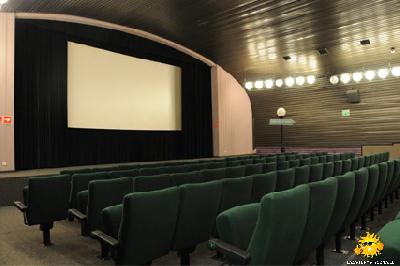16:10pm Polonia Kino, Piotrkowska 67
Polonia Kino is a sister cinema to Bałtyk and a fellow member of the Helios cinema chain (something equivalent to Odeon). Out of all the cinemas featured in this little project Polonia has perhaps the most ideal location, as it is housed toward the rear of a courtyard, just opposite The Grand Hotel, slap-bang in the centre of the city. There are at least two decent coffee shops barely a 50m walk from the cinema, as well as some of the best bars in the city within a 200m radius. Within the courtyard itself you have the added bonus of a longstanding Mexican theme restaurant, as well as the best of the Łódź Presto franchise Italian restaurants (one of the best value places to eat in the whole city). The exterior of Polonia looks like a traditional two-storey picturehouse, with a large foyer area and three screens. The concessions are a bit more tuckshop style than Bałtyk. I paid for 4 zł for a bottle of Sprite, which despite having been in a chiller was lukewarm at best.
Whereas Bałtyk tends to focus on 3D fare, big-budget blockbusters, kids movies and Polish releases, Polonia has diversified into indie fare, non-mainstream American releases and European cinema. My abiding memory of Polonia is as the cinema that I’d visit to watch those quiet little films like The Straight Story, About Schmidt and Genova. It seems fitting then that the movie I hustled up to see today was a low-key oddity starring Paul Dano and Kevin Kline, called The Extra Man. Sadly I was one of only two people in the cinema to watch the film. The screens in Polonia are classically raised, letterbox affairs, of the kind utilised by most provincial European picturehouses during the latter half of the last century. Being quite narrow horizontally it gives the impression that the image is somehow compacted, but really the projection is to ratio, with nothing missing from the frame. Initially the projection was slightly squint, but that was quickly corrected by the projectionist (how quaint) and, as with Bałtyk, the image quality was impressively clean throughout. Sound was functional without having the superior surround range of Bałtyk’s vast auditorium, however that is wholly appropriate for the more intimate charms of Polonia’s cinematic fare. The pricing for Polonia was exactly the same as Bałtyk, with my afternoon ticket costing 17zł. My sole serious complaint would be the prompt start time of the film, which means a complete absence of trailer material.
Cinema Experience: 8/10
Paul Dano is one of the most unusual performers currently working in Hollywood and his curious, slightly bruised, physical features and carefully mannered acting style made him a perfect piece of casting in this solid adaptation of Jonathan ‘Bored to Death’ Ames novel. At first the curious rose-tinted period vignette at the beginning of the movie threw me. I momentarily thought I was going to be subjected to the kind of retro-irony to be found in Todd Haynes Far From Heaven. However I was pleasantly surprised to see the way in which this gentle comedy-drama wended its way between the various different New York eccentrics that Ames loves to fixate upon. In the end it brought to mind the John Hurt and Jason Priestley feature Love and Death in Long Island.
The directing and writing team of Robert Pulcini and Shari Springer Berman previously brought Harvey Pekar’s curmudgeonly comic book genius to the big screen in American Splendor and they do a fairly good job of capturing some of the inspired slapstick and pathos of Ames’ source novel. They are aided on this front by a wonderful performance from Kevin Kline as the contrarily Catholic upper-class gigolo Henry Harrison. Every time that Kline shared the screen with Dano, the younger actor seemed to significantly raise his game, in much the same way as he did in the presence of Daniel Day-Lewis in There Will be Blood.
The quietly affecting absurdism of the film’s central idea, namely the confused sexual identity of Dano’s Louis Ives, provokes some laugh-out-loud funny moments, particular a sequence in which Kline rubs a small lap-dog all over his body to try to transfer fleas to the mutt, but the general tenor of the movie is that of gracefully declining elegy and nostalgia. In some ways it is a companion piece to my last viewing of the night, Woody Allen’s Midnight in Paris, which similarly deals with a central character who feels woefully out of touch with modernity. The Extra Man is by no means a masterpiece but in its own minor manner it manages to cast a compelling spell upon the attentive viewer, that can induce tears of both joy and sadness from such quirky sights as two men dancing upon a beach in the Hamptons. It also manages to pose the question: why isn’t Katie Holmes in more films?
Film Rating: 6.5/10



